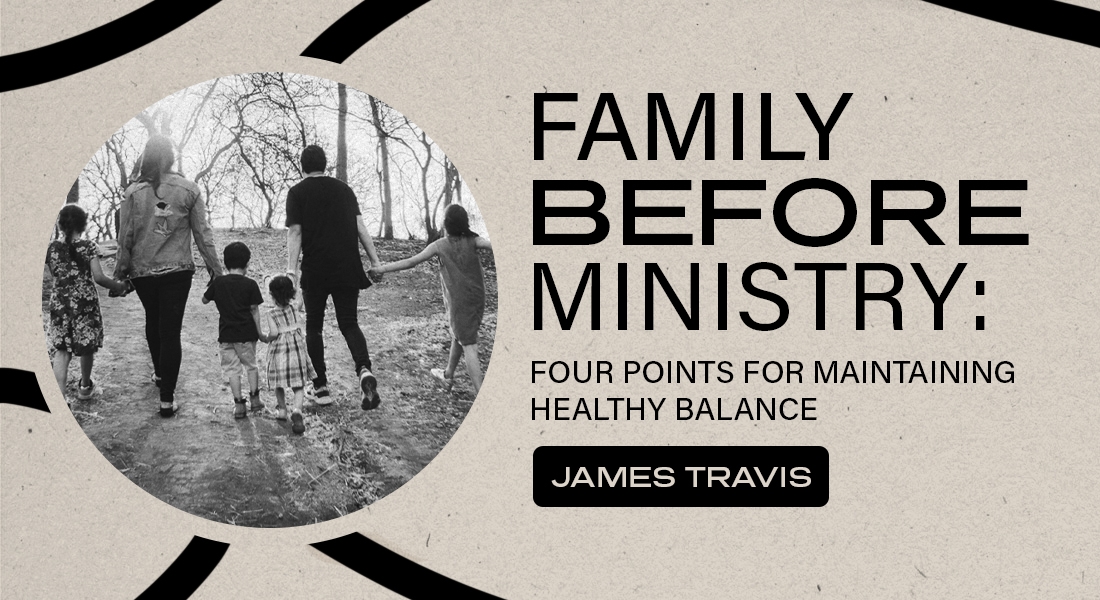
We’ve had some big changes in my home recently. Our young boys have started at a new school, and my wife has gone back to work after a break. These are all positive changes for our family, things we’d prayed about for a long time. For me, they have meant a couple of enforced changes to my tried and tested routine. They’re good changes, positive changes, but my fallible and fallen flesh struggled to change my rhythms and routines for others, even my family. I was so wrapped up in what I was doing as the pastor, trying to prove to people how committed I was as their minister, that I (initially) missed a significant opportunity to prove to my family that they are my primary ministry.
So, how do we make sure that they are?
When I was taking my first steps into vocational ministry, an older and wiser mentor said that, come what may, my priorities should never change: faith, then family, then my ministry. I must admit, being all fired up about giving more of my life to the call I felt, this advice didn’t sit well at first and is something I’ve wrestled with for a few years now. I was excited to spend more of my day equipping the saints for their own ministry (Ephesians 4:10-13). However, the longer I thought about it, and the more time has passed, I’ve come to see that he was absolutely right. I’ve seen it this last couple of weeks more than ever because, honestly, I’ve had it wrong, and I’ve fallen short.
One of the peculiarities of living in this part of the world is that many take an extended summer break. It’s hot; it’s quiet, and many leave for a couple of months. My wife and boys did so this year, leaving me here to pastor and potter around by myself. Without really trying, I got into such a rhythm and routine. That meant I knew where I’d be on any given day at any given time, barring an emergency. When my family came back, I found myself, to my shame, feeling resentful of the extra responsibilities and commitments I now had, and the additional demands on my time that appeared as soon as the plane landed. This only got worse as school started for them all. After the initial sinful and selfish shock wore off, I remembered what my old mentor had said. I also thought that it couldn’t be just me that feels like this from time to time. So, I resolved to share how I have been working through these feelings and thoughts, using the framework from my mentor: faith, then family, then ministry.
Faith First
Those in vocational ministry must have a sincere, personal, and genuine faith. Such a thing might sound like a given, but sadly, scripture shows us that this is not always the case (Micah 3:11, Judges 17-18, Exodus 32:2-6, Zephaniah 3:4). As the old saying goes, “You can’t pour from an empty cup,” and we must have a genuine faith in, and relationship with the Lord, about which to tell others. Simply, faith first, because this is what will last (1 Corinthians 3:12-15).
Then, Family
It’s unscriptural to think that you can be an effective minister of the Gospel to others if you are not that for those closest to you. In a paragraph detailing the character required of those called to the spiritual leadership of the church, Paul writes this:
“…If someone does not know how to manage his own household, how will he care for the church of God?” (1 Timothy 3:5, NET).
Thus, scripture explicitly tells us that family comes before church ministry.
How, then, do we do it? How do we make sure our families know that they are more important than our ministry?
Between 2015-2018, my life changed in almost every way possible: My wife and I had two children, I lost my job, I miraculously and spectacularly got another job. We moved house twice, I did a master’s degree, and I took over as the pastor of the international church we’d been part of for five years here in Bahrain. We had a busy few years, and I look genuinely terrible in photos from that period. This truth of faith, family, and then ministry was still valid during those hectic years. Let me share with you the four P’s that helped us through it.
1. Plan
You need to be intentional with your time. There’s an adage called “Parkinson’s Law” that says: “Work expands so as to fill the time available for its completion.”
You need to have a plan, and you’ll need to stick to it. If I had an hour to write a paper for seminary, I wrote it in an hour, and then I closed the computer. If I had 90 minutes while my little boys had a nap, I’d fill it with study. However, when they woke up, the family came first again. Make time for family time. I have rarely (if ever) had someone be mad at me for saying, “Sorry, can’t meet you on that day, I’m taking my son/wife to…”. If anything, people will respect you and your ministry more when they see you hold it in proper perspective. Plan to spend your time properly: faith, family, ministry, and then stick to it.
2. Present
When you’ve planned family time, be present. Not just physically present, but mentally, emotionally, energetically, and spiritually present. Don’t plan time for study and then think about study over coffee with your spouse. Don’t plan to take your kids to the beach and then let your mind drift to what you’re preaching about next week. Be present. Be there, all of you. A proper plan will help you be present because you know that you have time later/tomorrow to think about and work on whatever is trying to get in on your family time. Tell yourself, diligently, “No, I’ll do that tomorrow.” Commit your plan to paper, then commit to being present in all things.
3. People
Make a plan, be present, and involve people. When people want to help, as your brothers and sisters in the faith so often do, accept it. Is there something you are doing at church that someone else can be equipped, empowered, and platformed to do? If you can give more of yourself to your family by delegating tasks to someone else, shouldn’t you do it? This isn’t an excuse to cut short your core duties and responsibilities; I am simply encouraging you to consider including others in your plan if it helps you to be more present.
4. Pray
Finally, pray, pray, and pray some more. None of this will be possible without the Lord and His guidance. Sure, you could wake tomorrow and find a color-coded, hour-by-hour plan of your week miraculously waiting for you on your desk. However, more often than the miracle, God is going to guide you through the many, many prayers, the many times of reading and meditating on His Word, the many times you purposefully plan your time to honor Him, to show love to your family, and to serve His people and His church. More often than the miracle, God is going to guide you through the many prayers you pray.
Family is a precious gift that most would never consciously take for granted.
Sometimes, though, we unintentionally do so when we attempt to be all things to all people and forget who we are first. First, we’re known, loved, redeemed, forgiven, and accepted by the maker of heaven and earth. We’re made in His image to reflect His character and love to all creation, which defines us more than anything else. Secondly, He created us to love one another. For some, this takes the form of a physical family, a tremendous gift of God. For others, it’s a family of believing brothers and sisters. Beyond these two unequivocal commands (Matthew 22:34-40) comes our call, ministry, and mission to take God’s Good News of redemption and salvation through Jesus to those around us. I’ve got it wrong a few times and am ever thankful for a gracious, heavenly Father and a forgiving family.
As my old mentor said, “Faith, then your family, then your ministry.”









